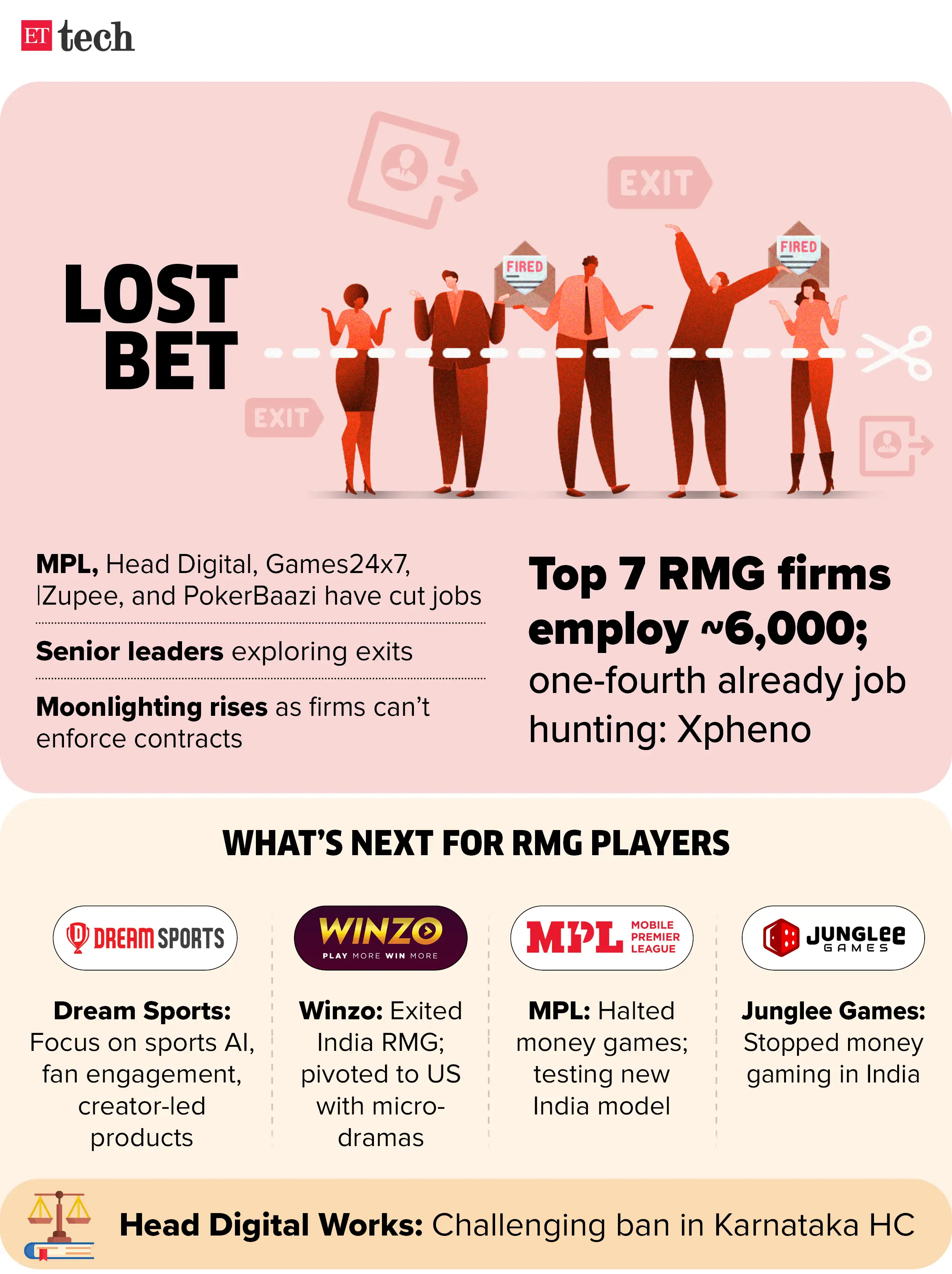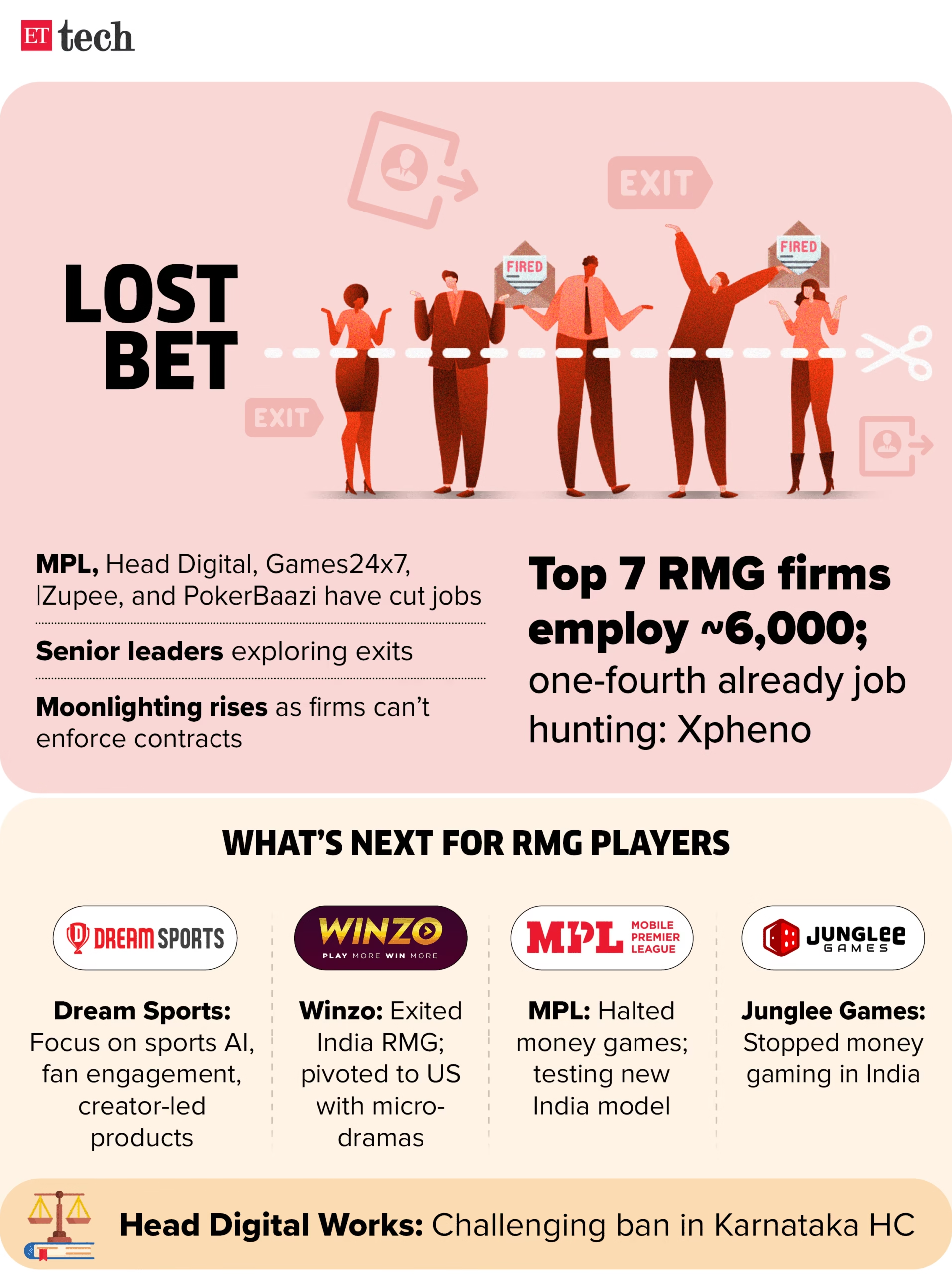The job cuts span major players such as Mobile Premier League (MPL), Head Digital, Games24x7, Zupee, and PokerBaazi.
Online gaming firm Gameskraft, which had halted all its real money operations, is also likely to lay off most of its 700 employees after October 31, said a person aware of the matter.
The company had already paid three months’ salary in advance after the government enacted the Promotion and Regulation of Online Gaming Act in August.
“Any speculation regarding lay off is premature,” a Gameskraft spokesperson said.
“The recently passed legislation has impacted the gaming industry significantly. Like many other companies, we are navigating a new regulatory and business reality in the aftermath of the Act. We are currently in the final phase of evaluating the ideas and inputs received,” the person said in an emailed response to ET.
According to staffing firm Xpheno, the top seven RMG firms employ about 6,000 people, with roughly one-fourth entering the job market even before the ban.
“With more enterprises announcing restructuring plans over the last few days, the impact in the job market will be visible going into next week,” said Kamal Karanth, cofounder of Xpheno.
Several senior executives at RMG firms have also begun exploring exits as companies halt operations or pivot to new models with whatever funds remain.
 ETtech
ETtechQueries sent to Mobile Premier League (MPL), Games24x7, Zupee, and PokerBaazi and messages sent to Deepak Gullappalli, founder of Head Digital Works, did not elicit responses until press time Monday.
Anshuman Das, cofounder and CEO of staffing firm Longhouse Consulting, estimated that 5,000-6,000 employees could ultimately be affected.
“The RMG ban is almost a death knell for the industry,” he said. “It’s game over for them. I believe about 40-50% of the workforce at least across 8-10 prominent companies will be impacted.”
Following the union cabinet’s decision to clear the gaming law last month, gaming federations had written to home minister Amit Shah, flagging that 200,000 jobs could be at threat as a result of the new legislation.
Another industry insider said several employees have already taken up moonlighting, with companies unable to enforce contracts in the current circumstances.
“Most senior executives at these companies are looking out. It will take some time to land jobs, so it’s going to be at least a month-long process before they resign,” the founder of a staffing firm said.
Many of these people were drawing annual salaries of Rs 4-5 crore, which are levels now unsustainable with revenue streams gone, said the founder who did not wish to be identified.
The legislation has forced many money-based gaming firms to exit India and slash staff.
Hike, operator of the RMG platform Rush, has announced a full shutdown in India. In a Substack post on September 13, founder and CEO Kavin Bharti Mittal said the decision followed discussions with investors and the team.
Last month, Winzo wound up its RMG business in India and entered the US market with micro-dramas.
MPL also halted all money-based operations in India, with founder Sai Srinivas telling employees in an internal email that India accounted for 50% of group revenue, all of which vanished under the new law.
On August 25, Flutter Entertainment, which owns Junglee Games, announced it had ceased real money operations in India, calling the regulations “disappointing.”
Platforms such as Dream11, Zupee, and Peak XV Partners-backed opinion trading startup Probo have also seen their models disrupted.
In an interview with ET on August 26, Dream Sports cofounder and CEO Harsh Jain acknowledged that staff could be affected but stressed the company’s commitment to retaining talent as long as possible. “We may need some cuts, but talent will be the last thing to go,” Jain said.
Also Read: Dream Sports CEO Harsh Jain: Won’t legally challenge real-money gaming ban by Indian govt
Industry experts noted the ban is wide enough to affect nearly every function, from tech and engineering to commercial operations and support. Roles ranging from product architects and developers to customer support and infrastructure staff have been hit, pushing many employees to look for opportunities both within and outside gaming tech.
Also Read: Real-money gaming apps see sharp decline in downloads, begin layoffs
